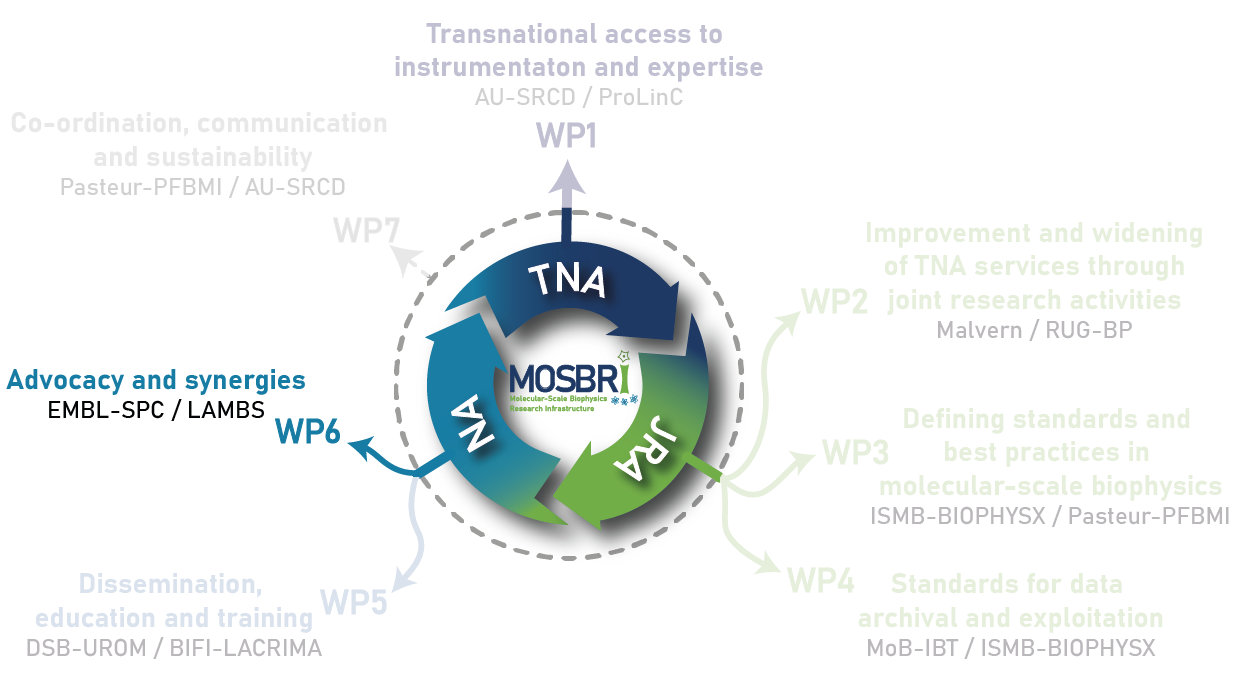WP6: NA – Advocacy & Synergies
- Leader: Maria Garcia Alai (EMBL-SPC, Hamburg, DE)
- Co-leader: Claudio Canale (LAMBS, Genoa, IT)
WP6 seeks to harmonize best practices amongst the MOSBRI partners and to disseminate such practices, including the results of our joint research activities, to the broader scientific community. In addition to activities promoting discussion and problem solving relying on the collective experience of the partners, we will also develop constructive interactions with a variety of external stakeholders, including other established scientific and technological communities, networks and infrastructures, learned societies, industry, journals and funding agencies.
The specific objectives are:
- To enable formal discussion between the partners about scientific issues relating to the delivery of high-quality services to users, particularly to share best experimental and data analysis practices and to determine priorities for joint research and benchmarking actions.
Workshop-style consensus meetings will be held which, will focus on discussions about best practice in experimental and data analysis procedures and improvement of technologies to address relevant biological questions. Each meeting will focus on a subset of the methodologies and pipelines proposed by the MOSBRI infrastructure. The meetings will bring together MOSBRI experts in each field of the agenda, plus experts from outside the consortium, instrument developers and CROs. The meetings will aim to facilitate exchange of experiences, and to reach understanding and adoption of best practices amongst the participants.
- To organize benchmarking activities of instruments and procedures within MOSBRI and with external stakeholders where appropriate.
An important benefit of the MOSBRI infrastructure will be the ability to work together to evaluate experimental and data analysis protocols. WP6 will coordinate benchmarking activities, to ensure that they are designed in a consistent and systematic manner, and in many cases to provide logistical support in terms of samples to be tested. Individual benchmarking studies will typically be led by technique experts from within the consortium, and will be organized in coordination with WP3, which will assess the validity of the proposal and propose a data analysis plan prior to the start of the study. The results will be presented to the whole consortium (and beyond) and if possible published in peer review journals. The results of benchmarking studies will be exploited to suggest improvements of standard practices, shared with all partners and disseminated publicly.
- To identify potential synergies and joint activities with industry and other academic communities, i.e. through interdisciplinary benchmarking studies or position papers.
- To disseminate standards and other best practice documents arising from MOSBRI activities.
The MOSBRI network will actively communicate all standard operating procedures (SOPs) to the molecular biophysics community and the scientific community at large. More specifically, the experts that have generated method developments will present them in international meetings and conferences. They will contact journal editors and funding agencies to advocate for optimized quality and acceptance standards and publish opinion papers on the subject, with the overall aim to improve the reliability of the biophysical data produced by the scientific community.
Potential synergies outside Europe will be explored, notably with the Biophysical Society (USA) and with representative organizations in Latin America and other continents. MOSBRI will be active in the organization of educational events promoted by the Biophysical society, such as the Biophysics Weeks, or promoting the formation of Biophysical Society Student Chapters as the already active Biophysics Genoa Student Chapter.
- To promote the adoption of standards and good practices by journal publishers and funding agencies.
- To establish formal contacts with selected external stakeholders and develop joint activities, e.g., scientific meetings or participation in externally organized standardization or outreach activities.
- To prepare a plan for long-term sustainability and operational stability of MOSBRI’s relations with its partners

